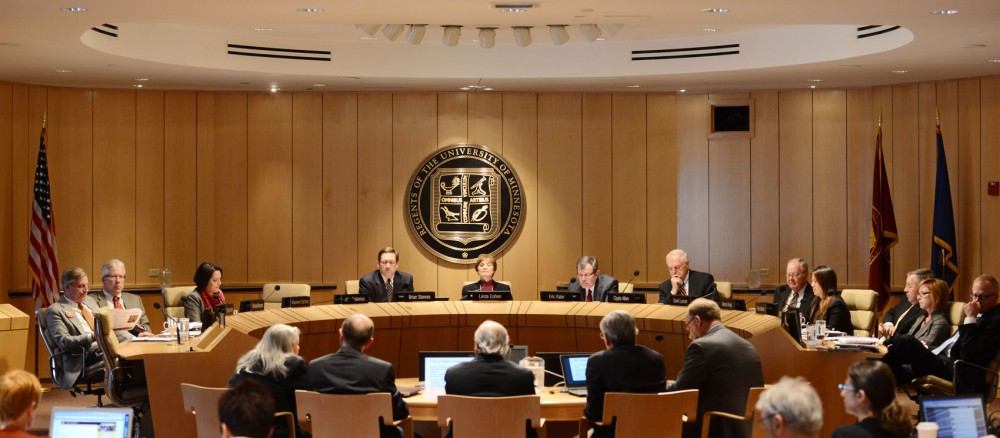University of Minnesota regents emphatically voted to take a new approach to funding for the University on Friday.
The Board of Regents unanimously approved President Eric Kaler’s 2014-15 budget request, which would freeze tuition, provide loan relief and fund University research.
The $1.2 billion request, an 8.4 percent increase from its budget for 2012-13, received praise from the regents for its accountability and assistance for students.
“President Kaler’s budget reflects a new tone, a new commitment and a new conversation, and I think all three are welcome,” Regent Laura Brod said. “[The budget] focuses on transparency and openness in a way that is really positive.”
The University is offering to freeze undergraduate tuition for two years if the state commits $14.2 million each year of the biennium toward tuition relief.
“We’ve seen tuition spiraling across the country, and the affordability question for families is becoming more and more difficult,” Brod said before voting. “… This budget really highlights our commitment to holding that tuition
affordable.”
Kaler’s budget includes an $18 million increase in funding for research for the biennium through the creation of MnDRIVE — Minnesota Discovery, Research, and InnoVation Economy. The program would fund research in robotics and advanced manufacturing, food supply, environmental conservation and research of treatments for brain
conditions.
Before voting, Tim Mulcahy, vice president for research, and four University professors led a presentation featuring innovations in each of the four areas of research, which board Chair Linda Cohen called “enlightening and exciting.”
“We have this phenomenal research that is absolutely critical to this country’s development,” Regent John Frobenius said. “It’s a very important thing for us, as a lucky repository to these great resources, to communicate our story broader and broader and broader.”
The budget includes plans to reduce operating costs and requests an additional $11.5 million if the University completes three of five “performance targets.”
The goals include increasing financial aid dispersion, invention disclosures and four- and six-year graduation rates.
The University also hopes to award at least 15,000 degrees in 2014.
To further reform higher education costs, the budget calls for a loan forgiveness program.
The program would provide $1.5 million in 2015 to partially relieve student loans for students who become health care professionals in underserved Minnesota communities.
The regents also approved renovations to its Community-University Health Care Center on Friday. The clinic, near West Bank, is in an area designated as medically underserved.
The University will officially send the request to the state by Monday, and it’ll go before the Legislature in the next session.


